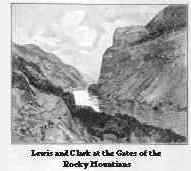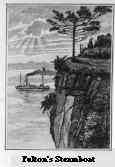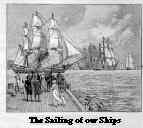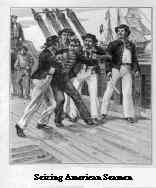Resource Center OLLibrary
|
1805-1806] |
|
195 |
|
for their guide, they made their way across the
mountains to the head waters of a stream flowing
westward. |
|
196 |
|
[1807 |
217. Effect of the French and English War
on the United States; the Leopard and the
Chesapeake. During all this time France and England
continued at war (§ 203). Each of these nations forbade the
United States to trade with the other. This in itself was
disastrous to our commerce; but, as if this was not enough,
England insisted on stopping our vessels on the ocean and
searching them for British sailors. Unless a man could prove that
he was an American by birth, the English seized him, especially if
he was an able-bodied seaman, and compelled him to enter their
service. In this way they had helped themselves to several
thousand men, whom they forced to fight for them on board their
ships of war. Finally (1807), the British man-of-war
Leopard stopped the Chesapeake, one of our war
vessels, at a time when the latter could make no effectual
resistance, and seized four of her men, one of whom they hanged as
a deserter.
218. The Embargo and the Non-Intercourse
Acts. Congress passed the Embargo Act (1807) to put an end to
these outrages. The Embargo forbade the sailing of any American
vessel from any of our ports, -- even a fishing smack found it
difficult to leave Boston to get mackerel. Congress hoped that by
stopping all trade with Europe we should be able to starve France
and England into treating us with respect.
But we did not starve them; our exports fell off
$40,000,000 in a single year, and the loss of trade caused great
distress and discontent.
At last New England grew desperate; there seemed
danger of rebellion, possibly of disunion, if the Embargo Act was
not repealed. Congress did repeal it, and (1809) passed an act,
called the Non-Intercourse Act, which forbade the people to trade
with Great Britain and France, but gave them liberty to trade with
other foreign countries. But though our exports rose, yet many men
who had been engaged in commerce turned their attention now to
manufacturing. This was one of the important results of the
Non-Intercourse Act, since many of the manufactories of the
country had their beginning at that time.
219. Burr tried for Treason. Meanwhile
(1807), Aaron Burr, who had been Vice President during Jefferson's
first term, was tried
|
1807 ] |
|
197 |
|
for treason.1 Burr had shot Alexander
Hamilton (§§ 196, 200), his political opponent,
in a duel. That act, hardly different from downright
murder, brought him into disgrace. Later, Burr planned an
enterprise for conquering Texas, which then belonged to
Spain. He probably hoped to get some of the western
states to join him, and to set up an independent nation
in the southwest, with New Orleans for its capital; he,
of course, meant to be its chief ruler. Burr's guilt was
not clearly proved, and he was permitted to go free. He
died in obscurity and poverty in New York. |
|
198 |
|
[1807-1809 |
move; and she kept on moving against both wind and current,
until, in thirty-two hours, she reached Albany.
In a few years Fulton's great invention made a
complete change in modes of travel. Steamboats were put on the
Ohio, the Mississippi, and the Great Lakes, and helped to open up
and settle the western part of the United States. A number of
years later (1819), the ship Savannah was fitted up with
paddle wheels that could be propelled by steam. She started from
Savannah, Georgia, and crossed the Atlantic. But nothing further
was done in that direction for twenty years; then Great Britain
sent out (1840) the first regular line of ocean steamers to
America (§ 280). From that time to this such vessels have
made trips, backward and forward across the Atlantic, with the
regularity of clockwork.
221. The Importation of Slaves forbidden.
The year following Fulton's triumph Congress put a stop to the
'Importation of slaves (§ 196, note I, paragraph 4) into the
United States (1808). The law had the hearty support of President
Jefferson. He, like Washington and most leading men of that day of
the South, was a slaveholder. But, like Washington and many other
influential Southerners, he hoped that the country would find some
peaceful means of freeing the negroes. Jefferson, in particular,
was beloved by his slaves, and would gladly have given them their
liberty, if he could have clearly seen how to do it. He continued
to hold them, as many other good men did, but he said, "I tremble
for my country, when I reflect that God is just."
222. Summary. Jefferson was our first
Democratic President. He purchased the territory of Louisiana,
thereby more than doubling the area of the United States, and sent
Lewis and Clark to explore the country to the Pacific. During
Jefferson's administration Fulton invented the first successful
steamboat and established steam navigation on the Hudson; the
pirates of Tripoli and Algiers were conquered; the importation of
slaves was stopped; and on account of trouble with Great Britain
and France, Congress passed the Embargo and the Non-Intercourse
Acts restraining our foreign trade.
|
1809 ] |
|
199 |
|
223. Madison's Administration
(Fourth President, Two Terms, 1809-1817);
Reopening of Trade |
|
200 |
|
[1809-1812 |
and flew out to sea." A great shout of joy went up from the
farmers, merchants, and shipowners, for they believed that the
fleet of vessels would return to fill thousands of empty pockets
with welcome dollars. But England denied having authorized Mr.
Erskine to make such an agreement. The result was that our trade
stopped as suddenly as it began, and New England was filled with
angry disappointment.
224. How Napoleon deceived us. Next,
Napoleon, Emperor of the French, had a word of promise for us. He
had seized and sold hundreds of our ships because we would not aid
him in his war against England. He now agreed to let our commerce
alone, provided we would bind ourselves not to send any of our
produce to Great Britain, but would let him and his friends have
what they wanted to buy. Napoleon's offer was a trick to deceive
us, and to get us into trouble with England. We agreed to his
terms; he did not keep his word, and the ill feeling between
England and America was made still more bitter.
225. Tecumseh's Conspiracy; Battle of
Tippecanoe. Meanwhile, it was discovered that Tecumseh, a
famous Indian chief of Ohio, had succeeded in uniting the savage
tribes of the West in a plot to drive out the white settlers.
General William H. Harrison, who became President thirty years
later (1841), met the Indians at Tippecanoe, in the territory of
Indiana, and defeated them in a great battle (1811). (Map, p.
203.) Tecumseh was not in that battle; but he took a leading part
in later ones, led by the English. Many Americans believed that
England had secretly encouraged Tecumseh's plot. This belief
helped to increase the desire of the majority for war with Great
Britain.
226. The War of 1812; the Henry Letters; the
Real Cause of the War; its Declaration. At this time a man
named Henry declared that the English government in Canada had
employed him to try to persuade the New England States to leave
the Union and join Canada. He showed a bundle of letters in proof
of the story. Madison paid Henry $50,000 for his bundle. The
letters were a fraud and Henry was a rascal; but, for a time, both
the President and Congress were deceived by this swindler, and our
hatred of Great Britain burned hotter than ever.
|
1812 ] |
|
201 |
|
The real, final cause of the war,
however, lay in the fact that England persisted in
exercising her assumed "right of search" (§ 217).
Her war ships stopped our merchant vessels, took American
seamen out of them, and forced them, under the sting of
the lash, to enter her service and fight her
battles.1 Her |
 Launching
their canoes (October 7, 1805) on its swift current, they
floated down till they entered a far larger river. Down
this they drifted, sometimes through perilous rapids,
until they came at last (November 7, 1805) to its mouth.
A dense fog hid everything. When it lifted, they found
themselves within sight of the Pacific Ocean. The river
they had descended was that which Captain Robert Gray of
Boston (who first carried the American flag round the
globe) entered from the Pacific, and named the Columbia
(1792); he thus gave us our first claim to Oregon.
Launching
their canoes (October 7, 1805) on its swift current, they
floated down till they entered a far larger river. Down
this they drifted, sometimes through perilous rapids,
until they came at last (November 7, 1805) to its mouth.
A dense fog hid everything. When it lifted, they found
themselves within sight of the Pacific Ocean. The river
they had descended was that which Captain Robert Gray of
Boston (who first carried the American flag round the
globe) entered from the Pacific, and named the Columbia
(1792); he thus gave us our first claim to Oregon. boat
to use under water in war, -- the "submarine" of to-day
(§ 44 1), -- launched, on the Hudson, the first
successful steamboat. He gave notice that he should start
from New York City for Albany. Up to that date all the
trade and travel on the river had been either by sailing
vessels or rowboats. Men called the steamboat "Fulton's
Folly." Thousands gathered at the wharf (August 17, 1807)
to laugh and jeer at the expected failure of the
invention.
boat
to use under water in war, -- the "submarine" of to-day
(§ 44 1), -- launched, on the Hudson, the first
successful steamboat. He gave notice that he should start
from New York City for Albany. Up to that date all the
trade and travel on the river had been either by sailing
vessels or rowboats. Men called the steamboat "Fulton's
Folly." Thousands gathered at the wharf (August 17, 1807)
to laugh and jeer at the expected failure of the
invention. with
Great Britain. When Madison1 became
President, Great Britain and France were actively at war,
and our ships were still forbidden by Act of Congress
(§ 218) to trade with either country. The President
was anxious to reopen commerce with one or both. Mr.
Erskine, the British minister at Washington, gave Madison
to understand that England would let our vessels sail the
seas unmolested, if we would promise to send our wheat,
rice, cotton, fish, and other exports to her and her
friends, but refuse them to her enemy, France. The
agreement was made.
with
Great Britain. When Madison1 became
President, Great Britain and France were actively at war,
and our ships were still forbidden by Act of Congress
(§ 218) to trade with either country. The President
was anxious to reopen commerce with one or both. Mr.
Erskine, the British minister at Washington, gave Madison
to understand that England would let our vessels sail the
seas unmolested, if we would promise to send our wheat,
rice, cotton, fish, and other exports to her and her
friends, but refuse them to her enemy, France. The
agreement was made. excuse
was that she seized men who were British subjects and who
had deserted and entered our service. This was true in
some cases, but England made no discrimination, but took
any able-bodied sailor she fancied. This was an outrage
that we could no longer bear; several thousand of our
citizens had been kidnaped, but England refused to stop
these acts of violence. For this reason Congress declared
war in the summer of 1812. New England, knowing that such
a war would ruin what commerce she had, was opposed to
fighting; but the rest of the country thought
differently, and with a hurrah for "Free Trade and
Sailors' Rights"2 the war began.
excuse
was that she seized men who were British subjects and who
had deserted and entered our service. This was true in
some cases, but England made no discrimination, but took
any able-bodied sailor she fancied. This was an outrage
that we could no longer bear; several thousand of our
citizens had been kidnaped, but England refused to stop
these acts of violence. For this reason Congress declared
war in the summer of 1812. New England, knowing that such
a war would ruin what commerce she had, was opposed to
fighting; but the rest of the country thought
differently, and with a hurrah for "Free Trade and
Sailors' Rights"2 the war began.


